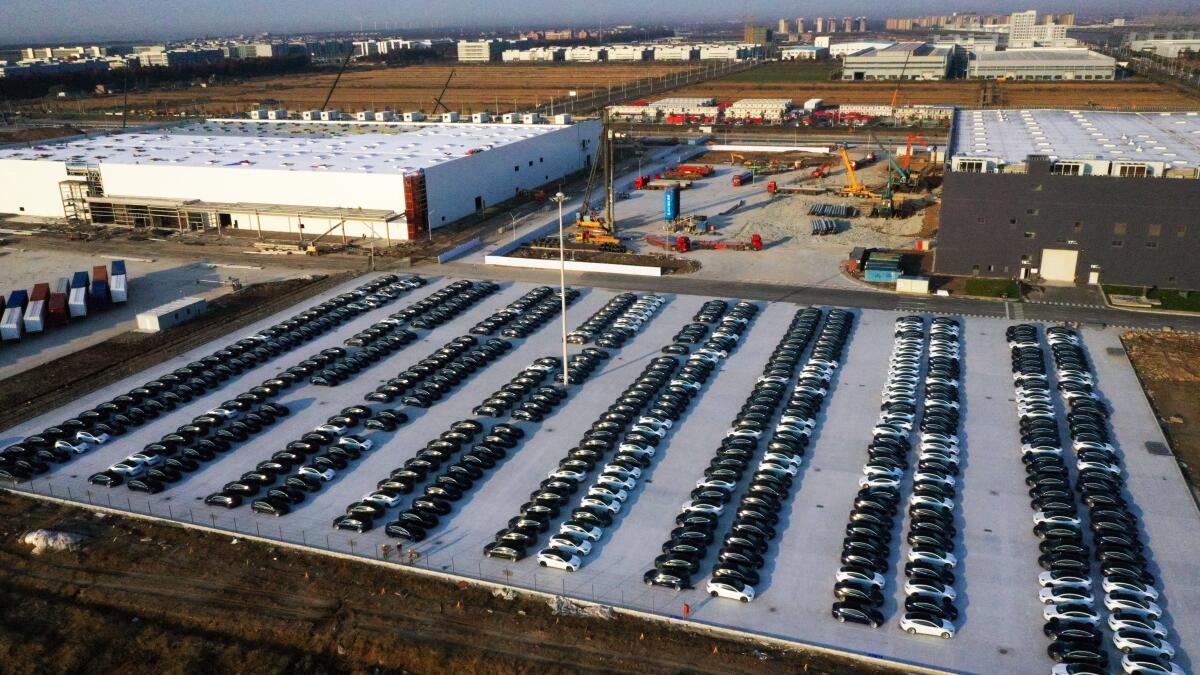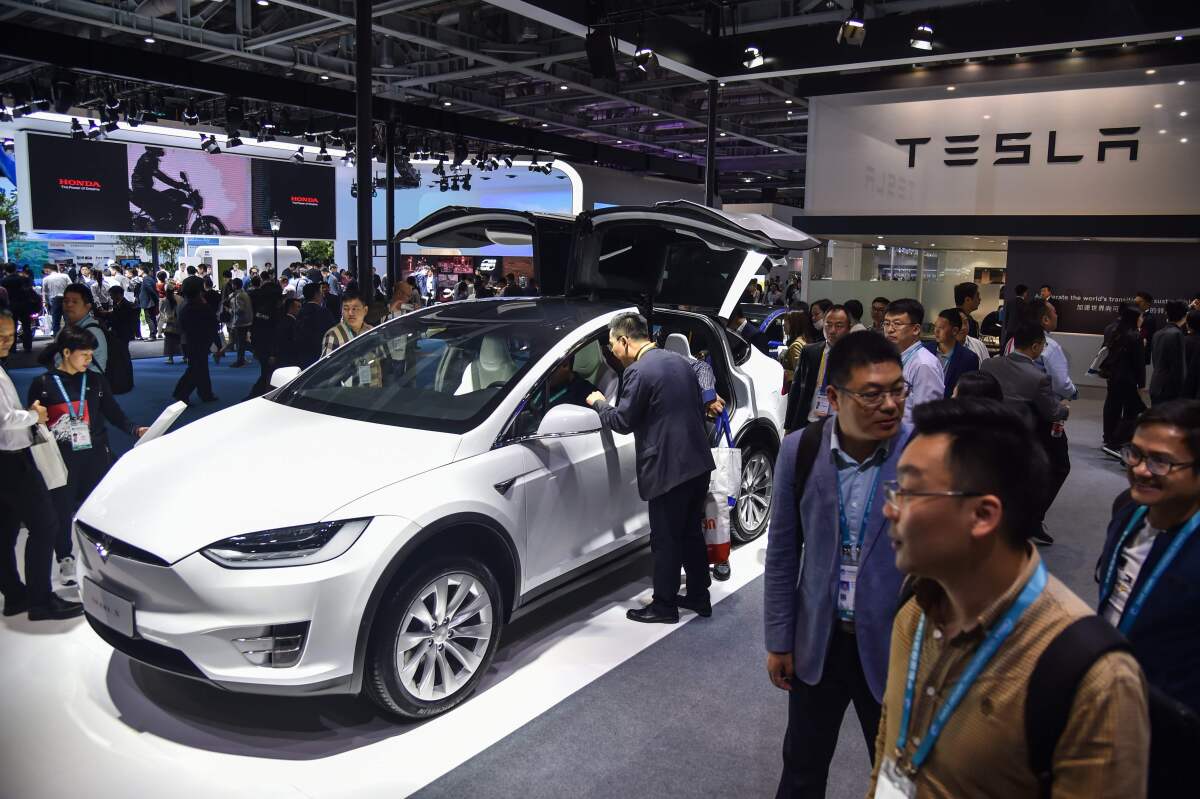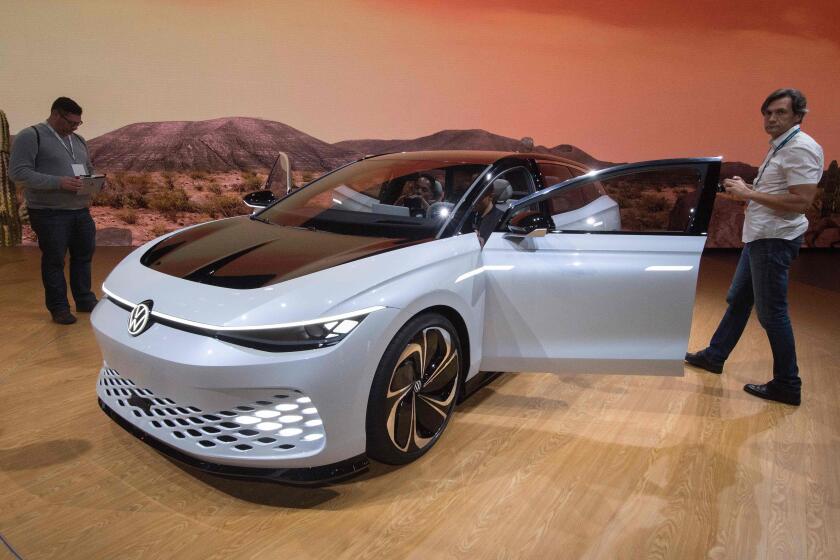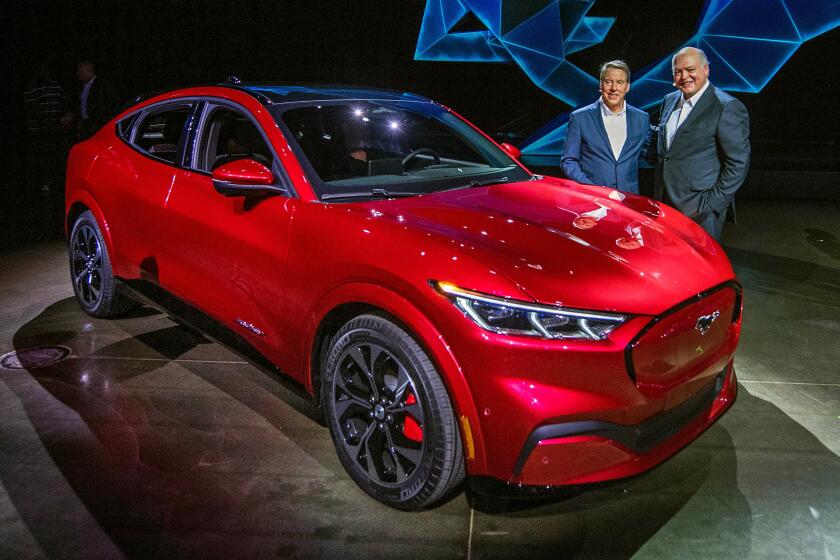Elon Musk’s moment of truth arrives with made-in-China Teslas

- Share via
Elon Musk’s decision to assemble Tesla Inc. cars in China required years of planning and billions of dollars in spending. Now comes the challenging part.
The electric Model 3 sedans rolling off the assembly line at Tesla’s Shanghai plant — its first outside the U.S. — face a market where total vehicle sales are expected to fall for a third straight year. After capturing about 5% of China’s car sales, electric vehicles have been losing steam as the economy has cooled and the government has scaled back subsidies for buyers.
That could spell trouble for a launch that investors are watching closely, seeking evidence that Tesla has what it takes to go global. A slow start for sales of its made-in-China cars would put more pressure on the unprofitable manufacturer’s finances, giving Musk little room for missteps to support a stock that’s hovering at an all-time high.
“Tesla is rushing to start deliveries before other global brands bring in more EVs,” said Zhang Yan, an analyst at research firm LMC Automotive in Shanghai. “It’s an attempt to conquer the market.”
A growing number of carmakers will arrive at the L.A. Auto Show with battery powered or plug-in hybrid SUVS and crossover utility vehicles.
EV sales plunged 42% in China in November as the government handouts that lowered sticker prices receded significantly. That means Musk and his team are looking at a market that’s very different from mid-2018, when the decision to build a Shanghai plant was announced. Back then, the industry’s sales were growing at a roughly 100% clip.
The tough market could mean that Tesla sells just 21,000 China-built Model 3s this year, according to LMC Automotive. That would qualify as a sluggish start given the Shanghai facility already builds more than 1,000 cars a week and plans to double production in coming months.

The forecast takes into account Tesla’s history of production delays, potential supply-chain constraints and the complexity of manufacturing high-quality cars at scale, LMC Automotive said.
But others are more optimistic. Yale Zhang, managing director of Shanghai-based consultancy AutoForesight, said Tesla could sell about 100,000 Model 3 cars. Wang Lei, a Shanghai-based analyst for China International Capital Corp., said Tesla could sell a combined 120,000 Model 3 and Model Y vehicles.
Given Tesla’s volatile share price, investors will be hyperfocused on the Shanghai ramp-up.
Success in boosting China sales could propel Tesla to as high as $500 a share, a Morgan Stanley analyst, Adam Jonas, said in a December note to clients. Tesla climbed to a record $443.01 on Friday after reporting it delivered 367,500 vehicles in 2019. The stock rose 26% last year.
Ford turns to electrified pickups, performance cars and SUVs to meet California’s greenhouse gas regulations.
So far, the China project has gone smoothly. Musk’s visits helped the company get preferential bank loans and swift approvals for construction and manufacturing. And although the subsidies are being phased out, the locally built Model 3 still qualified for a sizable handout of as much as about $3,550 per car.
But success requires winning over the consumer. A majority of China’s EV sales — about 70%, according to Sanford C. Bernstein — so far have been to the government and “policy-direct” customers, including taxis, mobility services and other government-affiliated fleet operators. Such buyers typically forgo premium cars like Teslas in favor of cheaper local models.
“It’s a distorted need,” said Robin Zhu, an analyst with Bernstein. “And the market won’t change much in the next two to three years.”
Cars that cost less than 100,000 yuan ($14,300) make up more than half of EV sales in China, according to Bernstein. Tesla last week cut the starting price of the Model 3 to 323,800 yuan (about $46,400) from 355,800 yuan ($51,000) — a 9% reduction. Subsidies lower the starting price to 299,050 yuan (about $42,900).
“To paraphrase Elon Musk, demand may be insanely high, but people literally cannot afford to buy them,” Zhu said.
To be sure, there is a segment of China’s massive population that can afford Teslas. But the Palo Alto, Calif.-based company won’t be the sole global EV brand targeting those buyers.
Volkswagen’s Audi plans to start selling nine new-energy-vehicle models in China during the next two years, with more than half of them pure battery-electric. The first electric model, the E-Tron, debuted in November at a starting price of about 693,000 yuan (about $99,300). Daimler’s Mercedes-Benz EQC electric model became available in October and starts at 580,000 yuan (about $83,100). BMW plans to start building the iX3 crossover in China next year and is working with a Chinese partner to electrify its Mini model.
There also is a slew of local upstarts targeting the premium segment. Electric SUVs from Nio Inc. and Guangzhou Xiaopeng Motors Technology Co., or Xpeng Motors, are priced aggressively and already have found fans.
Peer-to-peer car sharing seems strange but turns out to be easy, if a bit expensive.
“It will be challenging for carmakers to differentiate themselves and be competitive,” said Stephen Dyer, managing director at Alixpartners, a global consulting firm.
Tesla, a pioneer in electric cars, probably will have an edge for the next one to two years before competition starts catching up, said David Whiston, an analyst at Morningstar Inc. in Chicago. Tesla’s vehicles have an industry-leading driving range to go along with the brand appeal.
Boding well for the company, registrations of Tesla vehicles in China rose 14-fold to 5,597 in November. While growing from a low base, the figure suggests healthy demand for its cars even though all the models available thus far have been the pricier imported versions of the Model 3, and the higher-end Model S sedan and Model X SUV.
Tesla also doesn’t have to worry about selling traditional internal-combustion vehicles. Its global rivals operate expensive gas-guzzler plants in China and need to make sure their new EVs aren’t cannibalizing more profitable gasoline-powered lineups.
“Other multinationals, carrying the legacy of traditional automakers, came into the market reluctantly and lately. They are jumping in the pool they never wanted to swim in,“ said Bill Russo, chief executive officer of consulting firm Automobility Ltd. in Shanghai. “Tesla is not a conflicted company. They don’t have to choose.”
More to Read
Inside the business of entertainment
The Wide Shot brings you news, analysis and insights on everything from streaming wars to production — and what it all means for the future.
You may occasionally receive promotional content from the Los Angeles Times.












